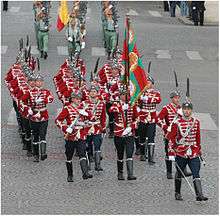Atilla (clothing)


The atilla is a fancy, braided Hungarian shell-jacket or short coat, decorated with lace and knots. It has become part of the official uniform of the Hungarian cavalry, hussar (or huszár), but was a part of the everyday wear of countrymen as well as nobility and officials.
It was made in many styles and many colors including black, gray, blue, green, red and white.
The origins of atilla believed to go back to the 16th century when Hungarians started wearing their short coats on one shoulder.[1]
One opinion is a romantic legend, explained by an English general to the effect that one night a Hungarian cavalry unit was attacked by the Turks and they had no time to dress properly. Instead they just threw on the short coat half shouldered and this is how they went to the battle. One of the deciding factor in their victory was the fact that the Turks, seeing the "flying sleeves of the short coats" thought that they are fighting men who had more than two arms, which in turn got them scared and made them run away.
Others believe that the cavalry wore their short coat on half shoulder to use it as a shield, like their ancestors did, wearing animal skins for the same purpose.
After 1850, the atilla worn by the cavalry men became longer.
In 1892, the atilla also became part of the Hungarian forester's ceremonial uniform. It was dark green or black with seven golden braids and golden buttons.
Mid 19th century it became the ceremonial tenue of the Royal Netherlands East Indies Army
An interesting fact is that Michael Kovats, the Hungarian hussar, who recruited, trained, organized, and led some of the first American cavalry into battle, wore an atilla as part of his uniform.
See also
References
External links
- Hussar uniforms from 1740-1780
- Hussar uniforms around 1800
- Hussar uniforms during the revolution 1848-1849
- Hussar uniforms after 1850
- Tompos Lilla: '48 hatása a magyar viseletre